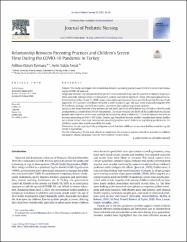| dc.contributor.author | Öztürk Eyimaya, Aslıhan | |
| dc.contributor.author | Yalçın Irmak, Aylin | |
| dc.date.accessioned | 2022-05-11T14:07:30Z | |
| dc.date.available | 2022-05-11T14:07:30Z | |
| dc.date.issued | 2021 | |
| dc.identifier.issn | 0882-5963 | |
| dc.identifier.uri | https://doi.org/10.1016/j.pedn.2020.10.002 | |
| dc.identifier.uri | https://hdl.handle.net/20.500.11776/5127 | |
| dc.description.abstract | Purpose: This study investigates the relationship between parenting practices and children's screen time following the COVID-19 outbreak. Design and methods: The population of the present cross-sectional study was the parents of children studying in three randomly-selected schools in the western, eastern and central regions of Turkey. The study data were collected between May 15 and 31, 2020, using a descriptive questionnaire form and the Parenting Practices Scale applied to 1115 parents of children between 6 and 13 years of age. The data were analyzed using the SPSS 21.0 software package, and with descriptive, correlation and multiple regression analyses. Results: It was noted that 68% of the mothers did not work, and 40.2% of the fathers had shifted to a flexible work arrangement as a result of the COVID-19 pandemic. The study revealed that 89.6% of the families had established ground rules related to screen time, and that the screen time of the children of 71.7% of the families had seen an increase, amounting to 6.42 ± 3.07 h/day. Gender, age, household income, mother's employment status, family's rules about screen time, and inconsistent parenting practices were defined as significant predictors in the children's screen time model created for the study. Conclusions: A vast majority of the participants stated that their children's screen time had increased during the COVID-19 pandemic. Practice implications: Screen time should be monitored, the necessary support should be provided to children, and parents should set ground rules for their children's screen times. © 2020 Elsevier Inc. | en_US |
| dc.language.iso | eng | en_US |
| dc.publisher | W.B. Saunders | en_US |
| dc.identifier.doi | 10.1016/j.pedn.2020.10.002 | |
| dc.rights | info:eu-repo/semantics/openAccess | en_US |
| dc.subject | Children | en_US |
| dc.subject | COVID-19 | en_US |
| dc.subject | Parenting practices | en_US |
| dc.subject | Quarantine | en_US |
| dc.subject | Screen time | en_US |
| dc.subject | adolescent | en_US |
| dc.subject | child | en_US |
| dc.subject | child parent relation | en_US |
| dc.subject | cross-sectional study | en_US |
| dc.subject | epidemiology | en_US |
| dc.subject | female | en_US |
| dc.subject | human | en_US |
| dc.subject | male | en_US |
| dc.subject | psychology | en_US |
| dc.subject | quarantine | en_US |
| dc.subject | questionnaire | en_US |
| dc.subject | turkey (bird) | en_US |
| dc.subject | Adolescent | en_US |
| dc.subject | Child | en_US |
| dc.subject | COVID-19 | en_US |
| dc.subject | Cross-Sectional Studies | en_US |
| dc.subject | Female | en_US |
| dc.subject | Humans | en_US |
| dc.subject | Male | en_US |
| dc.subject | Parenting | en_US |
| dc.subject | Quarantine | en_US |
| dc.subject | Screen Time | en_US |
| dc.subject | Surveys and Questionnaires | en_US |
| dc.subject | Turkey | en_US |
| dc.title | Relationship between parenting practices and children's screen time during the COVID-19 Pandemic in Turkey | en_US |
| dc.type | article | en_US |
| dc.relation.ispartof | Journal of Pediatric Nursing | en_US |
| dc.department | Yüksekokullar, Sağlık Yüksekokulu, Hemşirelik Bölümü | en_US |
| dc.identifier.volume | 56 | en_US |
| dc.identifier.startpage | 24 | en_US |
| dc.identifier.endpage | 29 | en_US |
| dc.institutionauthor | Yalçın Irmak, Aylin | |
| dc.relation.publicationcategory | Makale - Uluslararası Hakemli Dergi - Kurum Öğretim Elemanı | en_US |
| dc.authorscopusid | 57218579514 | |
| dc.authorscopusid | 56708761400 | |
| dc.identifier.wos | WOS:000614263600009 | en_US |
| dc.identifier.scopus | 2-s2.0-85095783700 | en_US |
| dc.identifier.pmid | 33181369 | en_US |



















